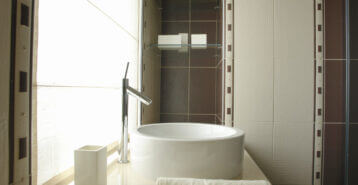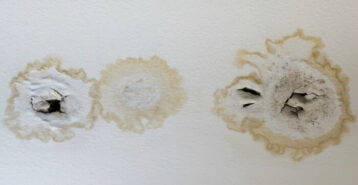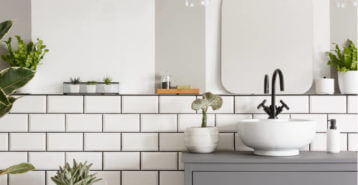Are you doing a bathroom remodel project?
Modernize can pair you with three to four pros in your area, so you can compare options and save time and money.
Thanks to tile’s durability and range of designs and colors, it is a material that can be found almost anywhere in the home. From bathrooms and laundry rooms to living rooms, tile can suit any style and take a beating over the years. But that doesn’t mean that tile is completely invincible. Whether it’s the age of the tile or heavy weight strain, it’s possible for bathroom tiles to crack or even shatter. On this page, we will go over common questions about damaged bathroom tiles, like: Why do tiles in the bathroom break in the first place? What is the best tiles for bathrooms? How can you repair bathroom tiles, and how much does it cost? And lastly, when should you turn to a contractor for help?
Why Do Tiles Break?
There are a number of reasons why your bathroom tiles might crack, chip, or break altogether. Common reasons include old age and having to withstand too much pressure and weight. Other reasons that tile could break:
- The tile was installed incorrectly. This could be using the wrong adhesive for the tile, or installing it over joints that expand and detract.
- Using the wrong type of tile in the bathroom. Not all types of tile are created equal! There are tiles that are fired to withstand heavy foot traffic, lighter tile meant for backsplashes, and outdoor tile that can handle cold temperatures and loads of foot traffic. And of course, there are water-resistant tiles that are best used in the bathroom.
- Extreme temperature changes. Rooms that experience temperature swings — like the bathroom during a hot shower — can cause less durable tiles to crack or chip.
- Low quality tiles. While tile is generally affordable across the board, if something is too cheap, it may cause you headaches down the road when they start breaking and need to be replaced.
Which Tile is Best for Bathrooms?
It is important to understand which tiles work best in the bathroom in order to prevent having to repair bathroom tiles down the road.
Porcelain and ceramic
There are many types of tile, but clay tile should be used in bathrooms because it is waterproof and durable. There are two main types of clay tile: porcelain and ceramic.
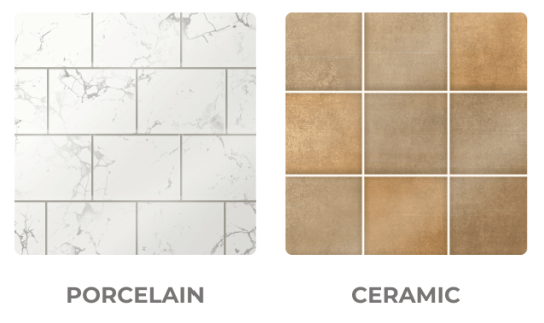
Porcelain tiles are fired at a higher temperature and made with a thicker clay, making them stronger. However, that doesn’t mean that ceramic tile should be discounted for bathrooms.
Indoor tile does not need to be quite as hard as tile used outdoors, so ceramic should be more than sufficient for your bathroom floors. Both porcelain and ceramic tiles are ideal for bathrooms because they are waterproof, easy to clean (especially when glazed), come in a variety of designs and colors, and long-lasting.
Glass and natural stone
You might consider using glass or natural stone for backsplashes, accent areas, or for shower walls and floors.
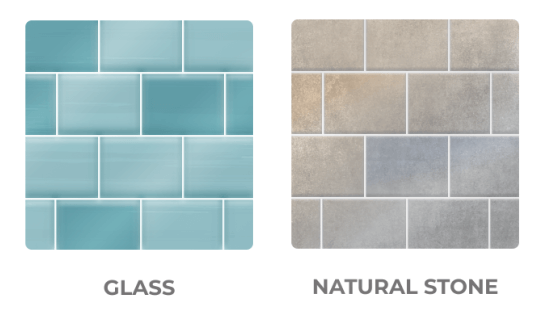
These types of tile are pricier than clay tiles, especially as you increase the amount of tiles you are installing. However, they can give off a unique modern appearance in the bathroom.
Keep in mind that natural stone, such as marble or quartz, and glass are not as durable as porcelain and ceramic. If you are looking to avoid having to repair bathroom tiles in the future, porcelain and ceramic tiles are the most practical option.
How to Repair Tiles in the Bathroom
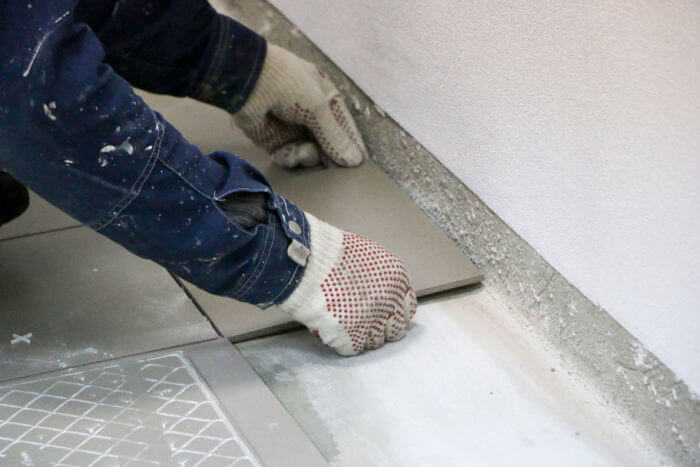
Your plan to repair bathroom tiles will depend on the placement of the tile and how many pieces are cracked or broken.
Find the Right Contractor for Your Bathroom Remodeling Project
Whether you’re ready to begin your project now or need some expert advice, our network of contractors are here to help. With a few simple questions, we’ll find the best local professionals for you
If only a single piece is damaged, DIY pros should be able to replace it on their own with the following tips:
Use Replacement Tiles
If you have leftover tile from the original project, then you’re in luck! This will ensure that the repair will be seamless and no one will ever notice it. The replacement tile will match the rest of the room.
If you do not have leftovers laying around, bring the broken piece with you to your favorite repair store. Try to find a replacement that is the same color, size, and thickness. Always ask a pro for their opinion to ensure the tile will match. Get a few pieces in case you accidentally break one during installation or for the future.
Apply Grout and Adhesive
Purchasing the right grout and adhesive is important. The grout you would use on the floor is different from what you would use in the shower, for example. Be sure to determine that the grout and adhesive you purchase is suited for the specific project you are working on.
There are two main types of grout: sanded and non-sanded. Sanded is best for wider grout lines, while non-sanded is ideal for more narrow grout lines. You will also want to try a sample to make sure that it dries the same color as the existing grout. Again, it is always a good idea to run it by a professional to ensure you are using the correct grout and adhesive.
Replacing the Tiles
If you are attempting to repair bathroom tiles DIY, follow these steps:
- Wear gloves and goggles — you don’t want a shard of tile to wind up in your hands or your eyes!
- Use a grout saw to remove the existing grout around the broken tile. Work slowly and be mindful of the surrounding tile.
- Use a chisel to chip away the rest of the broken tile. Try to make the area as smooth and level as possible.
- Test the new tile to make sure it will fit and lay flat. You don’t want someone to trip over a tile that is too high, or make it noticeable that a replacement was done.
- When you have confirmed that it fits properly, spread the adhesive on the back and stick it to the ground. Tape it down to keep it in place while the adhesive dries. Make sure other family members are aware of the project so they don’t ruin your hard work.
- Mix your grout and fill in the gaps around the tile with a plastic putty knife (a metal one can be too harsh). Use your fingertip or a wet sponge to wipe off excess and smooth out the grout. Do not expose the tile to water for a few days as the grout dries and hardens.
How Much Does it Cost to Repair Bathroom Tiles?
The cost to repair bathroom tiles will be different based on whether you are doing the project DIY or hiring a pro.
Having the entire bathroom floor tiling removed and replaced is a much larger project and costs $2,000 or more, depending on the size of the bathroom. If you are fine with the tile but want to replace the grout, a contractor can do this for a few hundred dollars. Remember, it is possible your tiles just need a bit of cleaning and maintenance!
Why is it Best to Use a Contractor for Bathroom Tile Projects?
While smaller projects are the perfect DIY opportunities, anything more than a tile or two is best left to the professionals.
Not only are contractors skilled and equipped with the right materials to get the job done right, but the strength of the tile is dependent on it being properly installed. If the foundation of the floor is poor, or the installation is not done correctly, the tile work will suffer for it. You will end up spending more money in the long run to have the tile replaced— again.
If you are searching for an experienced contractor to take on your bathroom tile replacement project, check out Modernize’s network of contractors in your area ready to start your project with you.
Find the Right Contractor for Your Bathroom Remodeling Project
Whether you’re ready to begin your project now or need some expert advice, our network of contractors are here to help. With a few simple questions, we’ll find the best local professionals for you
Reviews from Real Homeowners
Welcome to Homeowner Resources! We are the Modernize blog. Modernize pairs more than 3 million homeowners a year with pre-vetted contractors in their area. This blog started because we believe homeowners should know everything about their homes, from how their HVAC works to which front door colors they might love. On Homeowner Resources, you can find information on every part of your home, right down to how you can negotiate with contractors to get the best price. Here's more about the blog.
Need a contractor? Learn more about how Modernize finds the right pro for you.
